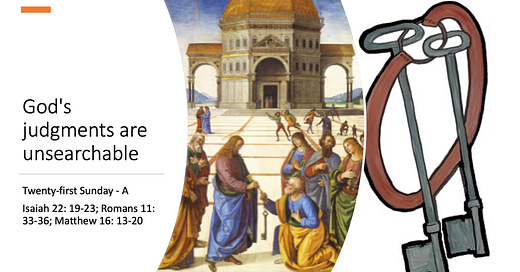Isaiah 22: 19-23; Romans 11: 33-36; Matthew 16: 13-20
The story of Shebna and Eliakim, the two officials of king Hezekiah in Judah, prepares us for the message of today's Gospel. Shebna was in charge of the palace, but for some reason, he displeased God (Is. 22:18). He was demoted to the position of a scribe and Eliakim took his place (2 Kings 19:2; Is. 36:3). On the day Eliakim took charge of the highest office in the country a symbolic key "of the House of David" was placed on his shoulder (Is. 22:22).
Today's Gospel took place in the vicinity of Caesarea Philippi in early autumn probably on the day of Atonement when Caiaphas, appointed by the Romans as the high priest, was about to pronounce the Holy Name of God - the only day in the year he could do it. There was a massive rock formation and an entrance to a cave the ancient called the gate to the land of the netherworld - Hades. In that place, Jesus asks his disciples two questions.
"Who do people say that the Son of Man is" (Matt. 16:13)? Public opinion falls short of grasping the real identity of Jesus (Matt. 16:14). It is so also today. We read and hear that Jesus was a great teacher of morality, political revolutionary, or religious reformer. "And who do you say that I am" (Matt. 16:15)? Peter alone answers this question and he gets it right: "You are Christ, the Son of the Living God" (Matt. 16:16). The leading role of Saint Peter among the apostle becomes visible (see Mark 16:7; Luke 24:34; John 20: 3-6; Acts 2:14).
"Blessed are you Simon, Son of Jona" (Matt. 16:17). The name "Simon" means "listen" and the greatest commandment begins with: "Hear, O Israel: The Lord our God, the Lord is one" (Deut. 6:4). Saint Peter did not come to this confession of faith by deduction but by listening to the voice of the Father. "For flesh and blood has not revealed this to you, but my Father who is in heaven" (Matt. 16:17). Since no one knows the Son except the Father (Matt. 11:27), so only the Father could reveal to the apostle the true identity of his Son.
Peter's parents gave him the name Simon, Jesus gives him a new name - Rock (Matt. 16:18). A change of name indicates a change of destiny. Peter is the Rock of faith on which Jesus would build his Church - the community of living stones who confess Jesus' Holy Name. Jesus will also entrust to him the "highest office" in the kingdom of heaven symbolized by the keys of grace. Finally, we hear that the Church will never go through the gates of Hades to the netherworld (Matt. 16:18-19) - the Bride of Christ shall last forever (Rev. 21:9-11).
"O, the depth of the riches and wisdom and knowledge of God!" (Rom. 11:33). The hymn praising the infinite wisdom of God ends Saint Paul's reflection on the relationship between Jews and Christians in God's plan of salvation. But the hymn is a fitting commentary on today's Gospel. Who would have thought that Jesus decides to build his Church on a simple fisherman from Galilee, who would try to lead Jesus away from the cross and deny him three times?
The fulfillment of the promise given to Peter (Matt. 16:18-19) has begun after Jesus' death and resurrection (John 21:15-17). Saint Peter loosened the bonds of sin (Acts 2:41), sickness (Acts 3:6-8), death (Acts 9:39-41), and made binding decisions for the entire Church (Acts 15:7-12). But he did not rely on his power or piety, but on the strength of the name of Jesus Christ (Acts 3:12). Finally, this promise did not end with his martyrdom but it continues in his successor - the bishop of Rome (LG, 25; CCC, 881-882). "How unsearchable are [God's] judgments and how inscrutable his ways!" (Rom. 11:33).




